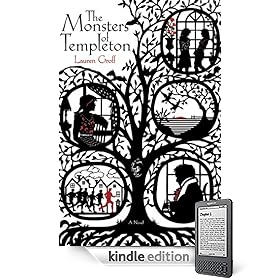
Most modern fiction that I've enjoyed - House of Leaves, Jonathan Strange and Mr Norrell, World War Z - has been written in a style that steps away from traditional narrative, incorporating different perspectives or faux-historical documentation. So when my bride-to-be finished Lauren Groff's debut novel The Monsters of Templeton, she knew I'd enjoy it and passed it straight to me.
I certainly did like it, with some reservations. Groff has done a masterful job creating a vibrant community full of interesting, believable characters, and populated a family tree which goes back several generations. Many of these people tell their own stories by way of recovered documents, hidden letters and photographs, and it is all pretty engrossing stuff. The present-day narrative is about Willie Upton, a young doctoral student who comes back to her hometown of Templeton, a stand-in for baseball's home of Cooperstown, after a bad affair with one of her professors. Home, Willie begins unravelling her family tree after her mother tells Willie that she has a father in town that she never knew; the story she'd believed all her life about an unknown dad somewhere on the West Coast was never true. Willie begins researching to uncover one strange secret from her influential family's history and finds quite a few more than she bargained for.
I was really unsatsfied by one point: the book only exists because Willie's mother is tight-lipped and refuses to answer the questions Willie needs. The journey is fun enough, and told in such an interesting way, that this monstrous plot problem is effectively papered over, but it can't help but feel inconsequential when the book is inevitably going to reach a climax which Vi could have provided around page 40. Or, put another way, it's the style of this book which I ended up enjoying more than the substance. I enjoyed that style a good deal, but I don't see this as a novel to which I'll return when the exercise, no matter how entertaining, feels ultimately pointless. I'd recommended this novel for group reading or book clubs, though, because it's certain to spark discussion.
No comments:
Post a Comment